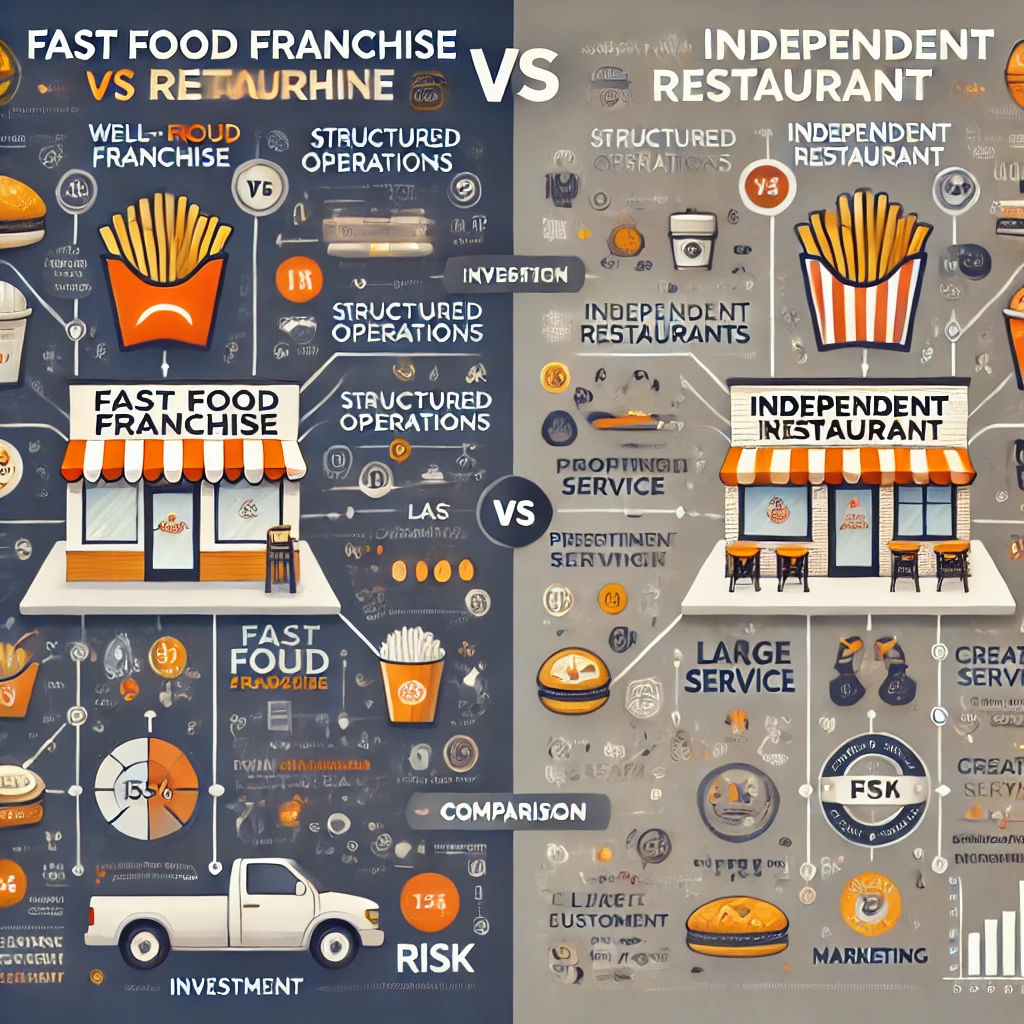Fast Food Franchise VS Independent Restaurant: Which is a Better
The food industry in India is growing at an unprecedented rate, with entrepreneurs looking to capitalize on the booming market. However, the big question remains: Fast Food Franchise VS Independent Restaurant—which is the better investment? While both have their advantages and challenges, this article will break down the key differences to help you make an informed decision.
Understanding the Market: Fast Food Franchise VS Independent Restaurant
India’s food and beverage industry is projected to grow at a CAGR of 10-12%, reaching $79 billion by 2028. With increasing disposable incomes and changing lifestyles, both fast food franchises and independent restaurants have vast opportunities. However, which model ensures better profitability and long-term sustainability?
1. Brand Recognition and Customer Trust
Fast Food Franchise:
- A fast food franchise benefits from an established brand name, making customer acquisition easier.
- Popular franchises like McDonald’s, ZORKO, KFC, and Domino’s already have strong brand loyalty in India.
- Customers trust franchises due to consistency in food quality and service standards.
Independent Restaurant:
- An independent restaurant starts from scratch, requiring years to build a loyal customer base.
- Brand recognition takes time and effort, demanding heavy marketing investments.
- Success depends on customer reviews and word-of-mouth recommendations.
2. Initial Investment and Setup Costs
Fast Food Franchise:
- Higher initial investment due to franchise fees, equipment, and licensing costs.
- Estimated investment: ₹10-15 lakhs depending on the brand and location.
- However, bulk purchasing power from the franchisor reduces procurement costs.
Independent Restaurant:
- Requires lower initial investment, but costs can fluctuate based on size and location.
- Estimated investment: ₹10-30 lakhs for setting up a new restaurant.
- Costs for branding, marketing, and menu development add financial strain.
3. Operational Support and Training
Fast Food Franchise:
- Offers structured training programs, supply chain support, and operational guidelines.
- Standardized operations ensure smooth business management.
- Franchisors provide ongoing support, reducing management stress.
Independent Restaurant:
- Owners are responsible for all operations, from staff training to supply chain management.
- No external support; everything needs to be built from the ground up.
- Requires industry knowledge and experience to handle daily challenges effectively.
4. Profitability and Return on Investment (ROI)
Fast Food Franchise:
- Faster breakeven due to an established customer base and proven business model.
- Average ROI: 1.5-2 years depending on location and brand.
- Franchises operate on lower risk, making them attractive to first-time entrepreneurs.
Independent Restaurant:
- Profitability depends on unique selling propositions (USP), marketing, and customer experience.
- Average ROI: 2-5 years, with risks of business failure being higher.
- High profit margins if successful, but challenges in scalability.
5. Marketing and Advertising
Fast Food Franchise:
- Leverages national and regional marketing campaigns funded by the franchisor.
- Strong online presence, TV ads, and influencer marketing boost visibility.
- Franchise owners benefit from brand-wide promotions.
Independent Restaurant:
- Requires high marketing budgets for online and offline promotions.
- Needs social media strategies, influencer partnerships, and customer engagement tactics.
- Marketing success varies based on creativity and execution.
6. Flexibility and Creativity
Fast Food Franchise:
- Limited flexibility in menu customization and branding.
- Must adhere to franchisor rules, operational guidelines, and menu pricing.
- Little room for innovation in food offerings.
Independent Restaurant:
- Full creative freedom in menu design, ambiance, and service experience.
- Owners can experiment with different cuisines, pricing models, and customer engagement tactics.
- Requires continuous innovation to stay relevant in a competitive market.
Market Trends: Fast Food Franchise VS Independent Restaurant
| Factors | Fast Food Franchise | Independent Restaurant |
|---|---|---|
| Brand Recognition | High | Low |
| Initial Investment | High (₹10-20 lakhs) | Moderate (₹10-30 lakhs) |
| Operational Support | Strong | None |
| Profitability (ROI) | 1.5-3 years | 2-5 years |
| Marketing Cost | Low (Brand-driven) | High (Self-funded) |
| Creativity & Flexibility | Low | High |
Final Verdict: Which One is Better?
Both fast food franchises and independent restaurants offer lucrative opportunities, but your choice depends on your investment capacity, risk appetite, and business goals.
- If you prefer lower risk, faster ROI, and brand-backed support, a fast food franchise is the better choice.
- If you enjoy creativity, have a unique concept, and want full control, an independent restaurant could be your ideal investment.
Conclusion
The debate on Fast Food Franchise VS Independent Restaurant depends on personal preferences and financial considerations. India’s growing food industry provides opportunities for both business models. If you’re looking for a reliable, scalable, and profitable venture, fast food franchise offer a tried-and-tested approach with a solid support system. However, if you dream of building your own food brand with full control, an independent restaurant could be the right path for you.
Key Takeaways:
- Fast food franchises offer brand recognition, structured operations, and faster ROI.
- Independent restaurants provide creative freedom, lower initial investment, but higher risk.
- Market trends suggest that the Indian fast food industry is growing at 10-12% CAGR, making both options viable for investors.
Whichever path you choose, success depends on location, quality, customer service, and marketing strategies. Now is the perfect time to dive into India’s thriving food industry!

